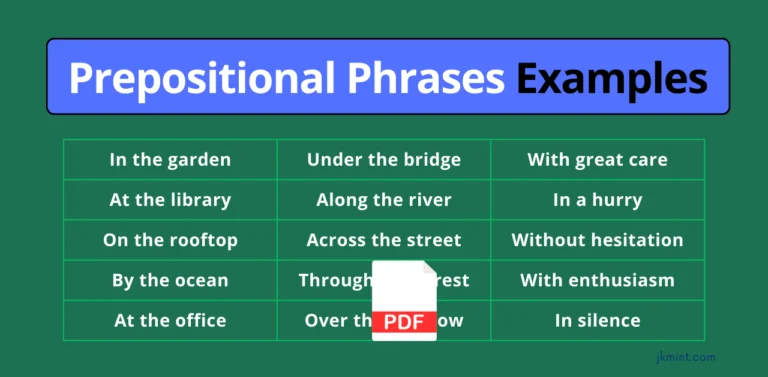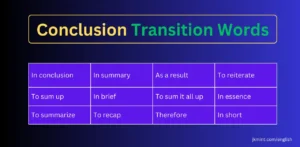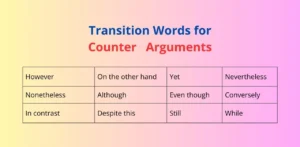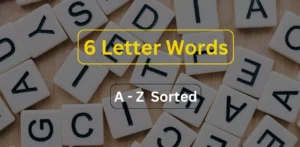Prepositional Phrases help us understand the where, when, why, and how of actions and relationships between various elements.
These phrases consist of a preposition and an object, providing crucial details such as time, location, direction, manner, purpose, possession, causality, and comparison.
The following table contains a few common Prepositional Phrases Examples:
| In the garden | Under the bridge | With great care |
| At the library | Along the river | In a hurry |
| On the rooftop | Across the street | Without hesitation |
| By the ocean | Through the forest | With enthusiasm |
| At the office | Over the rainbow | In silence |
| In the classroom | Below the surface | For relaxation |
Let’s explore these elements with examples to enhance our understanding of how prepositional phrases enrich our everyday communication.
Prepositional Phrases Examples
1. Time
Prepositional phrases related to time provide valuable information about when an action occurs. These phrases help us pinpoint specific moments or durations in our sentences.
For example, “at midnight” tells us the exact time an event takes place, while “by tomorrow” sets a deadline for completing a task.
| S.NO | Prepositional Phrase | Example Sentence |
|---|---|---|
| 1. | At midnight | The stars shine brightly at midnight. |
| 2. | In the evening | They usually have dinner in the evening. |
| 3. | Before the concert | We need to buy tickets before the concert. |
| 4. | During the movie | Please silence your phones during the movie. |
| 5. | After school | They like to play soccer after school. |
| 6. | At dawn | The birds start singing at dawn. |
| 7. | In a few hours | The cake will be ready in a few hours. |
| 8. | On weekends | They go hiking on weekends. |
| 9. | In the past | In the past, life was simpler. |
| 10. | By tomorrow | I’ll finish the report by tomorrow. |
| 11. | At the moment | I’m busy at the moment. |
| 12. | During the summer | We plan to travel during the summer. |
| 13. | Before sunrise | The fishermen set out before sunrise. |
| 14. | In a minute | I’ll be with you in a minute. |
| 15. | After the meeting | Let’s discuss the project after the meeting. |
| 16. | At lunchtime | They meet at lunchtime at the park. |
| 17. | In the 1990s | Fashion trends were different in the 1990s. |
| 18. | By next year | I hope to learn a new language by next year. |
| 19. | At the crack of dawn | Farmers begin their work at the crack of dawn. |
| 20. | During the holidays | Families often exchange gifts during the holidays. |
2. Location
Location prepositional phrases help us understand where an action takes place or the position of an object. They provide essential context in sentences.
For instance, “in the park” specifies the place of an activity, while “under the table” identifies the exact location of an object.
| S.NO | Prepositional Phrase | Example Sentence |
|---|---|---|
| 1. | In the park | Children love playing in the park. |
| 2. | Under the table | The cat hid under the table. |
| 3. | At the beach | We had a picnic at the beach. |
| 4. | In the library | He spent hours studying in the library. |
| 5. | On the rooftop | We watched the sunset on the rooftop. |
| 6. | At the museum | They saw beautiful art at the museum. |
| 7. | Under the stars | Camping is magical under the stars. |
| 8. | In the kitchen | She’s preparing dinner in the kitchen. |
| 9. | At the concert | They cheered loudly at the concert. |
| 10. | In the forest | Hikers explored deep in the forest. |
| 11. | Beside the river | We sat quietly beside the river. |
| 12. | In the classroom | Learning takes place in the classroom. |
| 13. | At the stadium | Fans cheered for their team at the stadium. |
| 14. | On the balcony | They enjoyed coffee on the balcony. |
| 15. | In the garden | She grows colorful flowers in the garden. |
| 16. | Behind the house | The children played hide-and-seek behind the house. |
| 17. | At the restaurant | They had a romantic dinner at the restaurant. |
| 18. | In the hospital | Nurses care for patients in the hospital. |
| 19. | By the lake | Families often picnic by the lake. |
| 20. | At the airport | Travelers rush to catch flights at the airport. |
3. Direction
Directional prepositional phrases describe the path or movement of an action or object. They help us visualize the flow of events.
“Towards the door” shows the movement’s direction, “across the bridge” indicates the path of crossing, and “up the hill” suggests an upward movement.
| S.NO | Prepositional Phrase | Example Sentence |
|---|---|---|
| 1. | Towards the door | They came down the river. |
| 2. | Across the bridge | They strolled across the bridge. |
| 3. | Up the hill | Hikers trekked up the hill. |
| 4. | Down the stairs | He carefully descended down the stairs. |
| 5. | Along the river | We took a leisurely walk along the river. |
| 6. | Through the forest | They hiked through the forest. |
| 7. | Over the fence | The dog jumped over the fence. |
| 8. | Towards the mountains | They gazed towards the mountains. |
| 9. | Past the park | The bus drove past the park. |
| 10. | To the beach | They headed to the beach for a swim. |
| 11. | Around the corner | The bakery is around the corner. |
| 12. | Across the desert | Explorers journeyed across the desert. |
| 13. | Up the ladder | He climbed up the ladder to the roof. |
| 14. | Down the river | They canoed down the river. |
| 15. | Along the coastline | They drove along the coastline for hours. |
| 16. | Through the tunnel | The train passed through the tunnel. |
| 17. | Over the hill | The view is stunning over the hill. |
| 18. | Towards the city | They headed towards the city for shopping. |
| 19. | Past the forest | The trail winds past the forest. |
| 20. | To the mountains | They dream of hiking to the mountains. |
4. Manner
Manner prepositional phrases add depth to verbs by explaining how an action is performed. These phrases enrich our descriptions.
For instance, “with enthusiasm” tells us the attitude behind an action, while “in silence” describes how an activity occurs quietly.
| S.NO | Prepositional Phrase | Example Sentence |
|---|---|---|
| 1. | With enthusiasm | She sang with enthusiasm. |
| 2. | In a hurry | He left the house in a hurry. |
| 3. | With care | She handled the fragile vase with care. |
| 4. | Without hesitation | He agreed without hesitation. |
| 5. | With confidence | She spoke with confidence in the meeting. |
| 6. | In silence | They walked through the forest in silence. |
| 7. | With grace | The ballerina danced with grace. |
| 8. | In surprise | He reacted in surprise to the news. |
| 9. | With determination | She tackled the challenge with determination. |
| 10. | In a friendly manner | They greeted their neighbors in a friendly manner. |
| 11. | With caution | Drive with caution on icy roads. |
| 12. | In a relaxed way | He spent the weekend in a relaxed way. |
| 13. | With great effort | They completed the marathon with great effort. |
| 14. | In a loud voice | She shouted in a loud voice to be heard. |
| 15. | With precision | The surgeon operated with precision. |
| 16. | In a playful manner | They joked in a playful manner. |
| 17. | With kindness | She always treats others with kindness. |
| 18. | In a professional way | He conducted himself in a professional way. |
| 19. | With love | They hugged each other with love. |
| 20. | In a serious tone | He spoke in a serious tone during the interview. |
5. Purpose
Purpose prepositional phrases reveal the reason or intention behind an action. They shed light on the goals or motivations of an event.
“For relaxation” indicates why someone does something, and “in order to learn” shows the purpose behind an action.
| S.NO | Prepositional Phrase | For Relaxation |
|---|---|---|
| 1. | For good luck | He carried a four-leaf clover for good luck. |
| 2. | With the intention of winning | She practiced diligently with the intention of winning. |
| 3. | In order to learn | He attended the workshop in order to learn new skills. |
| 4. | For entertainment | They gathered for entertainment at the concert. |
| 5. | With the hope of success | She started the business with the hope of success. |
| 6. | In the pursuit of happiness | He traveled the world in the pursuit of happiness. |
| 7. | For relaxation | They went to the spa for relaxation. |
| 8. | With the aim of improvement | She joined the gym with the aim of improvement. |
| 9. | In an effort to save money | They cooked at home in an effort to save money. |
| 10. | For the sake of clarity | He explained the concept for the sake of clarity. |
| 11. | With the purpose of communication | She wrote the email with the purpose of communication. |
| 12. | In order to impress | He dressed up nicely in order to impress. |
| 13. | For better understanding | They asked questions for better understanding. |
| 14. | With the goal of completion | They worked tirelessly with the goal of completion. |
| 15. | In an attempt to reconcile | They met in an attempt to reconcile their differences. |
| 16. | For educational purposes | They visited the museum for educational purposes. |
| 17. | With the intention of helping | He volunteered with the intention of helping others. |
| 18. | In order to stay healthy | She exercises daily in order to stay healthy. |
| 19. | For the love of music | They formed a band for the love of music. |
| 20. | With the purpose of raising awareness | They organized the event with the purpose of raising awareness. |
6. Possession
Possession prepositional phrases establish ownership or the relationship between an object and its owner. They help clarify who has control or authority.
“Of my friend” denotes the owner, “belonging to the company” indicates ownership, and “owned by the family” demonstrates possession.
| Serial Number | Prepositional Phrase | Example Sentence |
|---|---|---|
| 1. | Of my friend | That is the car of my friend. |
| 2. | Belongs to the company | The dog belongs to the family. |
| 3. | Of the teacher | The classroom is the property of the teacher. |
| 4. | Owned by the family | The mansion is owned by the family. |
| 5. | Of the company | The success of the company is impressive. |
| 6. | Belonging to the team | The trophy is belonging to the team. |
| 7. | Of the government | The decision is in the hands of the government. |
| 8. | Owned by the artist | The artwork is owned by the artist. |
| 9. | Of the organization | The mission of the organization is clear. |
| 10. | Belongs to the family | The masterpiece belongs to the artist. |
| 11. | Of the school | The reputation of the school is excellent. |
| 12. | Owned by the chef | The restaurant is owned by the chef. |
| 13. | Of the corporation | The shares of the corporation are valuable. |
| 14. | Belongs to the artist | The masterpiece is belonging to the artist. |
| 15. | Of the team captain | The decision is in the hands of the team captain. |
| 16. | Owned by the author | The copyrights are owned by the author. |
| 17. | Of the university | The campus of the university is vast. |
| 18. | Belonging to the government | The property is belonging to the government. |
| 19. | Of the family heirloom | The jewelry is a cherished of the family heirloom. |
| 20. | Owned by the musician | The song rights are owned by the musician. |
7. Causality
Causality prepositional phrases explain the cause or reason behind an event. They provide insight into why something happens.
“Due to bad weather” clarifies the reason for cancellation, while “because of the pandemic” shows the cause of the action.
| S.NO | Prepositional Phrase | Example Sentence |
|---|---|---|
| 1. | Due to bad weather | The flight was canceled due to bad weather. |
| 2. | Because of his laziness | He failed the exam because of his laziness. |
| 3. | As a result of the accident | The car was damaged as a result of the accident. |
| 4. | Thanks to her support | He succeeded thanks to her support. |
| 5. | In light of recent events | They decided to postpone the event in light of recent events. |
| 6. | As a consequence of their actions | The company suffered losses as a consequence of their actions. |
| 7. | Because of the delay | The meeting started late because of the delay. |
| 8. | Due to technical issues | The website crashed due to technical issues. |
| 9. | As a result of poor planning | The project failed as a result of poor planning. |
| 10. | Thanks to their teamwork | They completed the task thanks to their teamwork. |
| 11. | Because of the pandemic | Travel plans were canceled because of the pandemic. |
| 12. | Due to financial constraints | The project was scaled down due to financial constraints. |
| 13. | As a consequence of the decision | Changes were implemented as a consequence of the decision. |
| 14. | Because of a misunderstanding | They had an argument because of a misunderstanding. |
| 15. | Due to a scheduling conflict | The meeting was rescheduled due to a scheduling conflict. |
| 16. | As a result of the investigation | The truth came to light as a result of the investigation. |
| 17. | Because of the accident | Traffic was backed up because of the accident. |
| 18. | Due to a lack of communication | Confusion arose due to a lack of communication. |
| 19. | As a consequence of the decision | The company had to lay off employees as a consequence of the decision. |
| 20. | Because of the power outage | The concert was briefly interrupted because of the power outage. |
8. Condition
Condition prepositional phrases describe the circumstances that must be met for something to occur or for a particular action to take place. They outline the conditions or requirements.
“In case of emergency” sets a condition for preparedness, “without your help” specifies a situation, and “in the event of a fire” anticipates a condition.
| S.NO | Prepositional Phrase | Example Sentence |
|---|---|---|
| 1. | In case of emergency | Please keep this key in case of emergency. |
| 2. | Without your help | We cannot complete the project without your help. |
| 3. | In the event of rain | The event will be moved indoors in the event of rain. |
| 4. | In the absence of evidence | The suspect was released in the absence of evidence. |
| 5. | Without proper training | Operating heavy machinery is dangerous without proper training. |
| 6. | In the face of adversity | They remained resilient in the face of adversity. |
| 7. | Without further delay | Please submit your application without further delay. |
| 8. | In the event of a fire | Exit the building calmly in the event of a fire. |
| 9. | Without hesitation | He agreed to help without hesitation. |
| 10. | In case of illness | Keep a first-aid kit handy in case of illness. |
| 11. | Without a doubt | She is, without a doubt, the best candidate. |
| 12. | In the absence of witnesses | The crime went unpunished in the absence of witnesses. |
| 13. | Without exception | The rule applies to everyone without exception. |
| 14. | In the event of a power outage | The backup generator will kick in in the event of a power outage. |
| 15. | Without your permission | I won’t enter your room without your permission. |
| 16. | In case of severe weather | The school will be closed in case of severe weather. |
| 17. | Without proper guidance | Navigating the maze is impossible without proper guidance. |
| 18. | In the event of a breakdown | Call for assistance in the event of a breakdown. |
| 19. | Without any prior notice | The meeting was rescheduled without any prior notice. |
| 20. | In case of an emergency evacuation | Follow the evacuation plan in case of an emergency evacuation. |
9. Comparison
Comparison prepositional phrases are used to compare two things, emphasizing similarities or differences.
They help create vivid imagery. “Like a professional” compares someone’s skills, “as tall as a tree” highlights a height similarity, and “more intelligent than her” indicates a comparison of intelligence.
| S.NO | Prepositional Phrase | Example Sentence |
|---|---|---|
| 1. | Like a professional | She plays the piano like a professional. |
| 2. | As tall as a tree | The basketball player is as tall as a tree. |
| 3. | More intelligent than her | He is more intelligent than her. |
| 4. | As fast as lightning | The cheetah runs as fast as lightning. |
| 5. | Like a wildfire | The news spread like a wildfire. |
| 6. | As strong as an ox | He’s as strong as an ox. |
| 7. | More beautiful than a sunset | The view was more beautiful than a sunset. |
| 8. | Like a fish in water | She swims like a fish in water. |
| 9. | As quick as a flash | His response was as quick as a flash. |
| 10. | More colorful than a rainbow | Her artwork was more colorful than a rainbow. |
| 11. | Like a breath of fresh air | Her positivity is like a breath of fresh air. |
| 12. | As smooth as silk | The ride was as smooth as silk. |
| 13. | More delicious than chocolate | The dessert was more delicious than chocolate. |
| 14. | Like a ray of sunshine | Her smile is like a ray of sunshine. |
| 15. | As clear as crystal | His explanation was as clear as crystal. |
| 16. | More precious than gold | Their friendship is more precious than gold. |
| 17. | Like a well-oiled machine | The team worked like a well-oiled machine. |
| 18. | As bright as the sun | The day was as bright as the sun. |
| 19. | More valuable than a treasure | The antique is more valuable than a treasure. |
| 20. | Like a diamond in the rough | She’s a rare talent, like a diamond in the rough. |
Also Read: Transition Words To Start a Paragraph
Conclusion:
In conclusion, prepositional phrases are versatile tools that enable us to convey specific information in a clear and concise manner. From describing time and location to explaining causality and making comparisons, these phrases play a vital role in effective communication.
By incorporating them into our writing and speech, we can elevate our language and provide valuable context for our audience, making our messages more vivid and engaging.
FAQ’s
What is a prepositional phrase?
A prepositional phrase is a group of words that begins with a preposition and gives more information about a sentence’s subject or object.
How many types of prepositional phrases are there?
There are nine types: time, location, direction, manner, purpose, possession, causality, condition, and comparison.
Can you give an example of a time prepositional phrase?
Certainly! “At midnight,” as in “They arrived at midnight.”
What does a location prepositional phrase describe?
It describes where something is happening, like “In the park.”
How does a manner prepositional phrase add detail?
It tells us how an action is performed, like “With enthusiasm.”
When is a possession prepositional phrase used?
It shows who owns or possesses something, like “Of my friend.”
What does a causality prepositional phrase explain?
It shows the reason or cause behind an event, like “Due to bad weather.”
What is the purpose of a condition prepositional phrase?
It describes a situation or circumstance that must be met, like “In case of emergency.”
Can you give an example of a comparison prepositional phrase?
Sure! “More beautiful than a sunset,” as in “The view was more beautiful than a sunset.”
Why are prepositional phrases important in writing and speech?
They add clarity, context, and detail to our language, making communication more vivid and precise.




